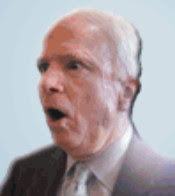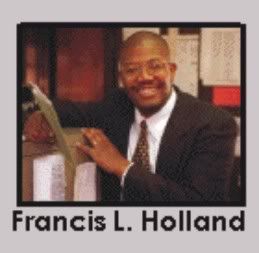A review of New York Times archives from 1990 and 1991 shows that Senator John McCain was a subject of a major financial and bank scandal, known as the "Savings and Loan Scandal", that dominated news coverage of the US Congress during that period.
According to the
New York Times, Senator John McCain and four other US Senators, who became known as the "Keating Five" during a Congressional investigation, received over a million dollars in campaign contributions from Charles H. Keating Jr. , the owner of Lincoln Savings and Loan Association of Irvine, Calif, and his associates. Then, John McCain and the other four senators intervened on behalf of the bank to prevent banking regulators from applying Federal laws and regulations meant to assure that Federally-insured banks remain solvent, because otherwise the taxpayers would have to pay the savings banks depositors back if the bank itself became unable to do so.
The intervention of John McCain and four other senators on behalf of a major contributor, leaning on federal regulators to turn a blind eye toward banking irregularities, prevented federal regulators from doing their job and cost taxpayers about two billion dollars in this one case alone. The New York Times says,
A senior savings and loan regulator said today that pressure imposed by an aide to Senator Alan Cranston in May 1988 caused regulators to delay an enforcement action against a huge California savings institution, creating greater losses for taxpayers.
The regulator, William K. Black, testified in the Senate Ethics Committee's hearings into the five Senators' actions on behalf of Charles H. Keating Jr. while he was owner of the savings and loan and a major contributor to their campaigns and to organizations they supported. Mr. Black, general counsel in the Office of Thrift Supervision's western division, was the first witness to tell of enforcement that was delayed because of pressure.
Mr. Black described a meeting of the Federal Home Loan Bank Board on May 5, 1988, in which a decision was made to "freeze the risk profile" of the Lincoln Savings and Loan Association of Irvine, Calif., or limit its high-risk commercial real estate investments. The next day, an aide to Senator Cranston, Democrat of California, called two top officials of the agency and "indicated severe displeasure" with its intention to bring the institution under tighter control, Mr. Black said. Day After the Call
Mr. Black said that the next day, in a move that he attributed largely to that call, the bank board agreed to a number of "modifications" that not only did "not freeze the risk profile, but expressly permitted Lincoln to make new direct investments," particularly expanding such investments. Another result is that Lincoln began investing heavily in high-risk, high-yield corporate debt securities, or junk bonds.
A result of these new investments was to increase the amount of the ultimate losses at the institution, Mr. Black said.
Mr. Black described a meeting of the Federal Home Loan Bank Board on May 5, 1988, in which a decision was made to "freeze the risk profile" of the Lincoln Savings and Loan Association of Irvine, Calif., or limit its high-risk commercial real estate investments. The next day, an aide to Senator Cranston, Democrat of California, called two top officials of the agency and "indicated severe displeasure" with its intention to bring the institution under tighter control, Mr. Black said.
Day After the Call
Mr. Black said that the next day, in a move that he attributed largely to that call, the bank board agreed to a number of "modifications" that not only did "not freeze the risk profile, but expressly permitted Lincoln to make new direct investments," particularly expanding such investments. Another result is that Lincoln began investing heavily in high-risk, high-yield corporate debt securities, or junk bonds.
A result of these new investments was to increase the amount of the ultimate losses at the institution, Mr. Black said. New York Times, December 6, 1990.
On April 2, 1987, Senator John McCain and four other US senators met with the chairman of the board of the Lincoln Savings and Loan Association of Irvine, California, after which an aide to one of the five senators called federal banking regulators and told them to 'lay off' this bank, letting it effectively do as it pleased. Without federal regulation, the bank failed and taxpayers picked up the tab.
Now, Senator John McCain wants to become president of the United States and we have to compare his record for probity to that of his opponents. Although McCain was not convicted of bribe-taking, it seems clear that he take enormous amounts of money from a contributor and then do the contributors bidding in a manner that cost taxpayers billions of dollars in this one case alone. Is that the kind of president we need to elect to clean up the messes of George W. Bush?

.jpg)
